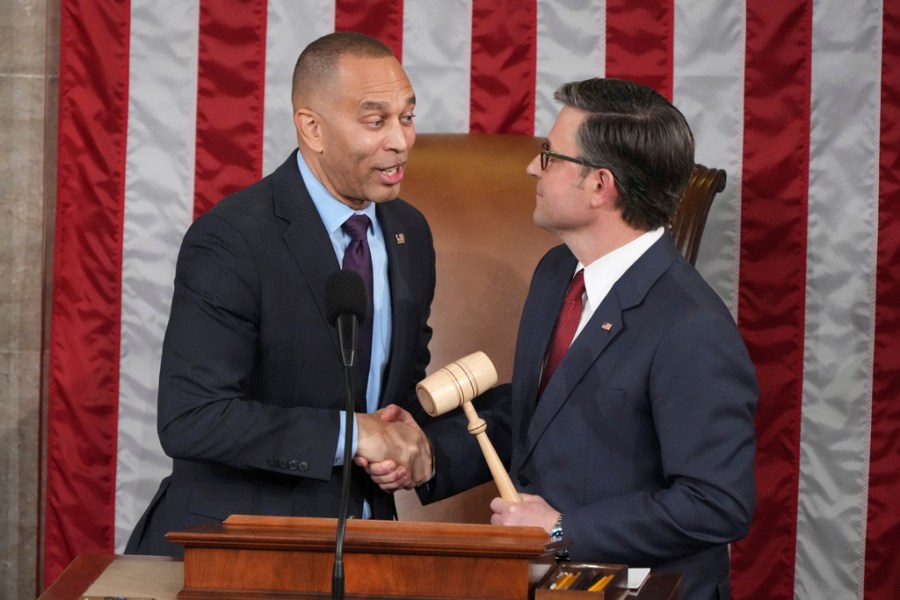
The opening day of a new Congress is usually electric — noisy, celebratory and hopeful. Constituents pack the galleries to watch their hometown heroes being sworn-in for the first time. In the House of Representatives, new members and old swarm the chamber in a mutual, self-congratulatory scrum of handshaking and back-slapping.
For the last two years, though, the opening day scene might as well have been accompanied by the theme song from “The Twilight Zone,” as host Rod Serling intones, “You are now traveling through another dimension of sight, sound and mind.”
The joy of a new beginning has been replaced by the somberness of a flailing for leadership and direction amidst intra-party fratricide. The just completed 118th Congress (2023-24) was showing signs of being a harbinger of a repeat scenario as the closing gavel fell, followed immediately by the gavel rap bringing the 119th Congress to order at noon on Jan. 3. All signs pointed to another possible round of multiple ballots to elect a Speaker.
In the 118th Congrerss it took 15 ballots over the first four days of session to elect Rep. Kevin McCarthy (R-Calif.) Speaker. After deals were cut, concessions made, and punitive actions threatened, McCarthy barely managed to win with the same 216 votes he had received on the previous ballot because this time four members switched their votes from other nominees to “not voting,” thereby lowering the majority threshold needed from 218 to 216 members.
McCarthy was skating on thin ice when, in early October 2023, the ice broke and his speakership and gavel sank to the bottom. The icebreaker came when then-Rep. Matt Gaetz (R-Fla.) offered a motion to oust the Speaker. A small band of eight Republicans joined with all House Democrats in adopting the motion to vacate.
What ensued was a three-week hiatus when the House stood still as jockeying took place behind the scenes to elect a new Speaker. The Republican Conference presented three nominees to the House, all of which were rejected, before Rep. Mike Johnson (R-La.), vice-chair of the GOP Conference, prevailed.
However, this time, the House did not have the luxury of running another 15-ballot marathon to elect a Speaker. On Jan. 6, Congress was obliged by law to certify the election of Donald J. Trump as president before a joint session of Congress. That could not happen without a duly sworn Speaker and House membership present.
After all members had voted, Johnson was still two votes short of a majority. Instead of announcing the vote and moving on to a second ballot, the acting-clerk, on somebody’s orders, simply held the vote open for an unusually long period as negotiations took place both on and off the floor to convince at least two of the three dissenting Republicans to change their votes.
The balance was finally tipped by several strategically placed phone calls by President-elect Trump to GOP leaders and two of the three holdouts subsequently changed their votes to Johnson. The newly elected Speaker was sworn in and delivered his acceptance speech.
The House then proceeded to debate and adopt a resolution setting House rules for the new Congress. The rule change that attracted most attention was to require that a motion to vacate the speakership be offered by a member of the majority party and be seconded by eight other majority party members. Previously, a single member of either party could offer the motion. Now it can only be offered by members of the majority.
In a not-so-subtle move, six Republicans had remained silent when their names were initially called on electing the Speaker. (They subsequently announced their votes for Johnson.) The concerted non-response of the silent six sent an obvious message. Their six votes, combined with the three Republicans who initially voted for members other than Johnson, could later be utilized to provide the nine votes required to offer a motion to vacate the speakership.
The groundwork had been laid and the implicit threat conveyed that if Johnson did not toe the line of the ultra-conservative Republicans, his tenure could be abruptly curtailed, just as Speaker McCarthy’s had been after just nine months in the chair.
As Rod Serling might have commented at the close of this latest in the ongoing Twilight Zone series on the speakership: “You never know how it will all end until you’ve been there.”
Don Wolfensberger is a 28-year congressional staff veteran who was chief-of-staff of the House Rules Committee in 1995. He is author of “Congress and the People: Deliberative Democracy on Trial” (2000), and, “Changing Cultures in Congress: From Fair Play to Power Plays” (2018).












